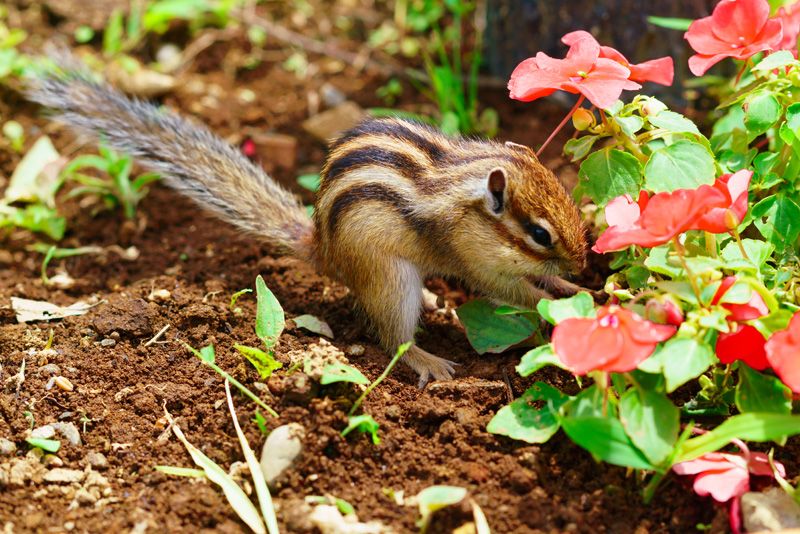
Chipmunks
Chipmunks
As cute as they might be, chipmunks are capable of causing immense damage to your garden. Once established, these fuzzy critters can transform your green abode into a lifeless, barren piece of land. Hence, it is essential to deter them as soon as you see signs of their presence. Chipmunks are basically squirrel-like creatures, ranging in size from 8-10 inches long and featuring five dark stripes running through their back and sides. Although smaller and less bushy than squirrels, chipmunks also have bushy tails.
A characteristic feature of chipmunks are the pouches in their cheeks that allow them to store food. Later, they transfer this food to the underground network of tunnels. As omnivores, they can feed on a variety of food sources, including seeds, fruits, foliage, acorns, roots, and insects. The worst part is the extensive underground tunneling caused by them, resulting in damage to roots as well as bulbs. They are highly intelligent creatures, thus, the only way to keep them away is to outsmart them. Read on to learn some practical ways to protect your garden from these pesky rodents.
What attracts them to the garden?
Like most rodents, chipmunks are attracted to the wide variety of accessible food in your gardens. Their first instinct whenever they see something is to nibble and try to taste it.
Compared to other members of the rodent family, chipmunks are the most avid nut destroyer and cause extensive damage to your gardens. By understanding what lures them to your garden, you can take effective measures to keep them away.
Accessible food and water
Easy access to food and water is what appeals to chipmunks the most. From a variety of plants, seeds, and fruits to bird feeders and debris, the food options are endless. In addition, gardens also possess convenient water sources, alluring critters and other garden pests.
Cozy shelter
Garden sheds, dense vegetation, piles of debris, and fallen trees all provide a safe and cozy spot for these furry critters to rest during their expeditions. They prefer resting in their underground network of tunnels; however, they also need some protection from predators when they are out looking for food and water.
Loose soil
Chipmunks prefer loose soil for burrowing and making underground tunnels. It is easier and faster, providing an excellent base for their excavation endeavors. Since burrowing is an essential part of their survival, they need a perfect pitch to plan the tunneling.
How to deter them away?
These agile creatures are extremely persistent, hence, it can be tricky trying to deter them away. But don’t worry! With patience and consistency, you will definitely see results in a few weeks using these strategies. Based on expert opinions and multiple trial and errors by the gardening community, here are a few effective ways to keep them away.
Natural deterrents to keep them away:
Habitat modification
In simpler terms, habitat modification means altering parts of your green space that chipmunks consider a part of their habitat. This will discourage them coming to your yard and tunneling in the ground. Start by moving your plants under the clear sky and trimming dense vegetation that serves as a hiding spot for critters.
Prey animals, such as squirrels and chipmunks prefer wandering undercover to protect themselves from predators. By placing your plants under open space, you can form a protective zone around your field. You can also try covering bare soil with large stones to prevent them from burrowing in the ground.
Trapping
Live-chipmunk traps are widely used to trap these critters without causing them any harm. You basically bait the chipmunks with peanut butter, nuts, or fruits and lead them to the trap. Once trapped, you can release them far from your place. You can also use snap traps, however, they are not humane, therefore not readily advised.
Fencing
Chipmunks are excellent climbers and burrowers, hence; regular fencing will not work on them. You need an advanced fencing system, such as an electric fence that produces a slight shock when touched. Make sure you cover individual plants with fine mesh wire or hardware cloth for adequate protection. The fencing should be at least 2 feet tall, and buried 6 inches deep to keep the chipmunks at bay.
Premise of other deterrents
Spraying repellants
Sprinkling spices on the plants or growing plants with strong scents can help deter the critters by making the environment unfavorable. You can easily make a chipmunk repellent spray at home by mixing peppermint oil, cayenne pepper, and garlic powder in apple cider vinegar. Spray it once a week and after every rain to see fast results.
Ultrasonic device
Ultrasonic devices produce high frequency sound waves that are only detected by critters, such as chipmunks, squirrels, and cats. Place these devices around your garden, ensuring your crops fall within the range. These devices do not always show 100% results. Hence, you may have to implement other natural deterrents as well for maximum protection.
Closing the entryways
If your garden is all fenced up and the chipmunks are still causing havoc, there is definitely a secret burrow giving them passage to your garden. You need to find that opening and seal it by filling it with gravel, placing heavy stones over it, and finally covering it with chicken wire. Ensure the area under your gates and sheds are also sealed to prevent further outbreaks.
